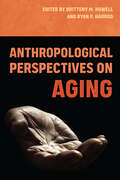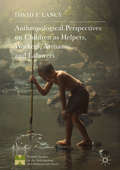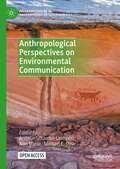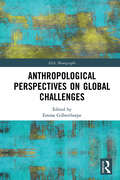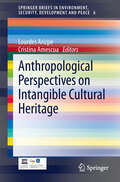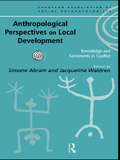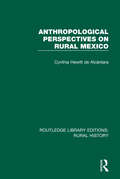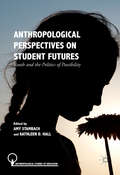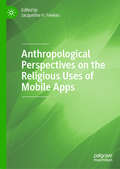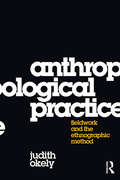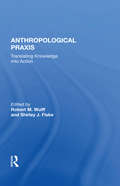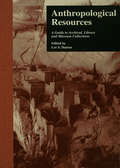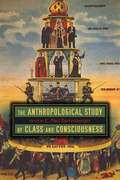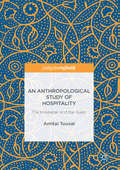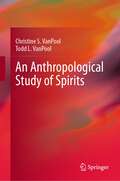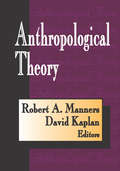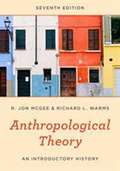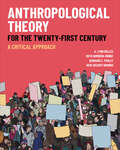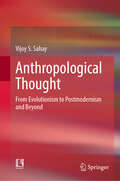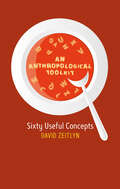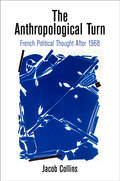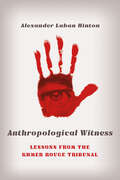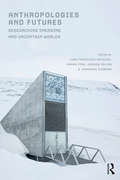- Table View
- List View
Anthropological Perspectives on Aging
by Britteny M. Howell and Ryan P. HarrodAn in-depth and wide-ranging approach to the study of older adults in society Taking a holistic approach to the study of aging, this volume uses biological, archaeological, medical, and cultural perspectives to explore how older adults have functioned in societies around the globe and throughout human history. As the world’s population over 65 years of age continues to increase, this wide-ranging approach fills a growing need for both academics and service professionals in gerontology, geriatrics, and related fields.Case studies from the United States, Tibet, Turkey, China, Nigeria, and Mexico provide examples of the ways age-related changes are influenced by environmental, genetic, sociocultural, and political-economic variables. Taken together, they help explain how the experience of aging varies across time and space. These contributions from noted anthropological scholars examine evolutionary and biological understandings of human aging, the roles of elders in various societies, issues of gender and ageism, and the role of chronic illness and “successful aging” among older adults.This volume highlights how an anthropology of aging can illustrate how older adults adapt to shifting life circumstances and environments, including changes to the ways in which individuals and families care for them. The research in Anthropological Perspectives on Aging can also help researchers, students, and practitioners reach across disciplines to address age discrimination and help improve health outcomes throughout the life course.
Anthropological Perspectives on Children as Helpers, Workers, Artisans, and Laborers (Palgrave Studies on the Anthropology of Childhood and Youth)
by David F. LancyThe study of childhood in academia has been dominated by a mono-cultural or WEIRD (Western, educated, industrialized, rich, and democratic) perspective. Within the field of anthropology, however, a contrasting and more varied view is emerging. While the phenomenon of children as workers is ephemeral in WEIRD society and in the literature on child development, there is ample cross-cultural and historical evidence of children making vital contributions to the family economy. Children's "labor" is of great interest to researchers, but widely treated as extra-cultural--an aberration that must be controlled. Work as a central component in children's lives, development, and identity goes unappreciated. Anthropological Perspectives on Children as Helpers, Workers, Artisans, and Laborers aims to rectify that omission by surveying and synthesizing a robust corpus of material, with particular emphasis on two prominent themes: the processes involved in learning to work and the interaction between ontogeny and children's roles as workers.
Anthropological Perspectives on Environmental Communication (Palgrave Studies in Anthropology of Sustainability)
by Annelie Sjölander-Lindqvist Ivan Murin Michael E. DoveIn the continuous search for sustainability, the exchange of diverse perspectives, assumptions, and values is indispensable to environmental protection. Through anthropological and ethnographic analyses, this collection addresses how interests, values, and ideologies affect dialogue and sustainability work. Drawing on studies from three continents – Europe, North America, and South America – the paradoxes and the plurality of meanings associated with the creation of sustainable futures are explored. The book focuses on how communication practices collide with organizational frameworks, customary practices, livelihoods, and landscape. In so doing, the authors explore the meanings of environmental communication, pushing beyond environmental advocacy rhetoric to emphasize stronger anthropological engagement within communities to achieve more impactful environmental communication practice. Empirically the book’s chapters explore a diverse set of issues, ranging from coastal management in the European north to Native American place naming in Alaska. They further share findings from studies of contaminated land remediation in Sweden, conflicts over water resources in Chile, management of heritage and national parks in Northern Arizona, and cultural transmission in Slovakia.This is an open access book.
Anthropological Perspectives on Global Challenges (ASA Monographs)
by Emma GilberthorpeThis volume offers a snapshot of anthropological perspectives on global challenges. Whilst it could not hope to represent the full scope of anthropological perspectives, those that are presented highlight some of the critical flaws embedded in such an all-encompassing notion. The contributors reveal the possibilities of reimagining the ways in which ‘challenges’ are understood and addressed and demonstrate how a combination of deep understanding of the past and collaboration, cooperation and inclusive dialogue about the future, can improve the chances of positive action. The collection thus not only shows us that perspectives must change, but also how that change might be realised. Whilst the chapters are authored solely by anthropologists, this book is not solely for anthropologists. The book is illustrative of the practical and theoretical insights that anthropology can offer those individuals, teams, and policy- and decision-makers engaged in research, mitigation and/or intervention practices in relation to the global challenges. Beyond academia, it contributes to broader understandings of the challenges we collectively face at this point in time and how we might collectively and effectively address them.
Anthropological Perspectives on Intangible Cultural Heritage (SpringerBriefs in Environment, Security, Development and Peace #6)
by Cristina Amescua Lourdes ArizpeA decade after the approval of the UNESCO 2003 Convention for the Safeguarding of Intangible Cultural Heritage (ICH), the concept has gained wide acceptance at the local, national and international levels. Communities are recognizing and celebrating their Intangible Heritage; governments are devoting important efforts to the construction of national inventories; and anthropologists and professionals from different disciplines are forming a new field of study. The ten chapters of this book include the peer-reviewed papers of the First Planning Meeting of the International Social Science Council's Commission on Research on ICH, which was held at the Centro Regional de Investigaciones Multidisciplinarias (UNAM) in Cuernavaca, Mexico in 2012. The papers are based on fieldwork and direct involvement in assessing and reconceptualizing the outcomes of the UNESCO Convention. The report in Appendix 1 highlights the main points raised during the sessions.
Anthropological Perspectives on Local Development: Knowledge and sentiments in conflict (European Association of Social Anthropologists)
by Simone Abram Jacqueline WaldrenThis collection examines the conflicts and realities of development at a local, empirical level. It provides a series of case studies which illuminate the attitudes and actions of all of those involved in local development schemes. The material is drawn from Southern and Eastern Europe, Asia and Africa. All the contributors use rigorous anthropological methods of analysis to shed light on the place of feelings of personal sentiment and identity in reactions to planned development schemes. In a world where direct action and public protest are routine responses to local development schemes, they show how protesters, developers and politicians often hold very different fundamental views about the environment, society, government and development which go beyond partisan economic and political interests.
Anthropological Perspectives on Rural Mexico (Routledge Library Editions: Rural History #8)
by Cynthia Hewitt AlcántaraIn this title, first published in 1984, the author examines the social and political forces surrounding the practice of anthropology at different periods in the history of Mexico since 1917. She does this by analysing and tracing the development of competing anthropological perspectives, from ethnographic particularism and functionalism through indigenismo, cultural ecology, Marxism and the dependency paradigm, to the historical structuralism of the 1970s. This book provides the basis for a systematic analysis of peasant studies in Mexico, and discusses in stimulating terms the theoretical and empirical difficulties of the profession of anthropology itself.
Anthropological Perspectives on Student Futures: Youth and the Politics of Possibility (Anthropological Studies of Education)
by Amy Stambach and Kathleen D. HallThis book examines diverse ways in which young people from around the world envision and prepare for their future education, careers, and families. The book features cutting-edge anthropological essays including ethnographic accounts of schooling in India, South Africa, the US, Bhutan, Tanzania, and Nigeria. Each chapter focuses on today’s generation of students and on students' use of education to create new possibilities for themselves. This volume will be of particular interest to practicing teachers and anthropologists and to readers who seek an ethnographic understanding of the world as seen through the eyes of students.
Anthropological Perspectives on the Religious Uses of Mobile Apps
by Jacqueline H. FewkesThis edited volume deploys digital ethnography in varied contexts to explore the cultural roles of mobile apps that focus on religious practice and communities, as well as those used for religious purposes (whether or not they were originally developed for that purpose). Combining analyses of local contexts with insights and methods from the global subfield of digital anthropology, the contributors here recognize the complex ways that in-app and on-ground worlds interact in a wide range of communities and traditions. While some of the case studies emphasize the cultural significance of use in local contexts and relationships to pre-existing knowledge networks and/or non-digital relationships of power, others explore the globalizing and democratizing influences of mobile apps as communication technologies. From Catholic confession apps to Jewish Kaddish assistance apps and Muslim halal food apps, readers will see how religious-themed mobile apps create complex sites for potential new forms of religious expression, worship, discussion, and practices.
Anthropological Perspectives on Tooth Morphology
by G. Richard Scott Joel D. IrishResearchers have long had an interest in dental morphology as a genetic proxy to reconstruct population history. Much interest was fostered by the use of standard plaques and associated descriptions that comprise the Arizona State University Dental Anthropology System, developed by Christy G. Turner, II and students. This system has served as the foundation for hundreds of anthropological studies for over 30 years. In recognition of that success, this volume brings together some of the world's leading dental morphologists to expand upon the concepts and methods presented in the popular The Anthropology of Modern Human Teeth (Cambridge University Press, 1997), leading the reader from method to applied research. After a preparatory section on the current knowledge of heritability and gene expression, a series of case studies demonstrate the utility of dental morphological study in both fossil and more recent populations (and individuals), from local to global scales.
Anthropological Practice: Fieldwork and the Ethnographic Method
by Judith OkelyAnthropologists are increasingly pressurised to formulate field methods for teaching. Unlike many hypothesis-driven ethnographic texts, this book is designed with the specific needs of the anthropology student and field researcher in mind, with particular emphasis on the core anthropological method: long term participant observation. Anthropological Practice explores fieldwork experiences unique to anthropology, and provides the context by which to explain and develop practice-based and open-ended methodology. It draws on dialogues with over twenty established and younger anthropologists, whose fieldwork spans the late 1960s to the present day, taking place in locations as diverse as Europe, India, Malaysia, Indonesia, Africa, Iran, Afghanistan, North and South America.Revealing first-hand and hitherto unrecorded aspects of fieldwork, Anthropological Practice provides critical, systematic ways to enhance anthropological and alternative knowledge. It is an essential text for anthropology students and researchers, and for all disciplines concerned with ethnography.Interviewees include: Paul Clough, Roy Gigengack, Louise de la Gorgendière, Suzette Heald, Michael Herzfeld, Signe Howell, Felicia Hughes-Freeland, Ignacy Marek Kaminski, Margaret Kenna, Raquel Alonso Lopez, Malcolm Mcleod, Brian Morris, Hélène Neveu Kringelbach, Akira Okazaki, Joanna Overing, Jonathan Parry, Carol Silverman, Mohammad Talib, Nancy Lindisfarne-Tapper, Sue Wright, Helena Wulff, Joseba Zulaika.
Anthropological Praxis: Translating Knowledge Into Action
by Robert M. Wulff Shirley J. FiskeThis book is a collection of original case studies describing anthropological knowledge successfully translated into action. It describes the targeted problem or issue, his or her role as an anthropologist, the specific anthropological skills or knowledge used, and the results of the work.
Anthropological Resources: A Guide to Archival, Library, and Museum Collections (Sociology/Psychology/Reference #Vol. 884)
by Lee S. Dutton Michele Calhoun Francis X. Grollig S. J. Thomas L. Mann Hans E. Panofsky Margo L. Smith Sol Tax Christopher WintersFirst published in 1999. Routledge is an imprint of Taylor & Francis, an informa company.
The Anthropological Study of Class and Consciousness
by E. Paul DurrenbergerPresenting prehistoric, historic, and ethnographic data from Mongolia, China, Iceland, Mexico, Brazil, and the United States, The Anthropological Study of Class and Consciousness offers a first step toward examining class as a central issue within anthropology. Contributors to this volume use the methods of historical materialism, cultural ecology, and political ecology to understand the realities of class and how they evolve. Five central ideas unify the collection: the objective basis for class in different social orders; people's understanding of class in relation to race and gender; the relation of ideologies of class to realities of class; the U.S. managerial middle-class denial of class and emphasis on meritocracy in relation to increasing economic insecurity; and personal responses to economic insecurity and their political implications. Anthropologists who want to understand the nature and dynamics of culture must also understand the nature and dynamics of class. The Anthropological Study of Class and Consciousness addresses the role of the concept of class as an analytical construct in anthropology and how it relates to culture. Although issues of social hierarchy have been studied in anthropology, class has not often been considered as a central element. Yet a better understanding of its role in shaping culture, consciousness, and people's awareness of their social and natural world would in turn lead to better understanding of major trends in social evolution as well as contemporary society. This book will be of great interest to students and scholars of anthropology, labor studies, ethnohistory, and sociology.
The Anthropological Study of Class and Consciousness
by E. Paul DurrenbergerPresenting prehistoric, historic, and ethnographic data from Mongolia, China, Iceland, Mexico, Brazil, and the United States, The Anthropological Study of Class and Consciousness offers a first step toward examining class as a central issue within anthropology. Contributors to this volume use the methods of historical materialism, cultural ecology, and political ecology to understand the realities of class and how they evolve. Five central ideas unify the collection: the objective basis for class in different social orders; people's understanding of class in relation to race and gender; the relation of ideologies of class to realities of class; the U.S. managerial middle-class denial of class and emphasis on meritocracy in relation to increasing economic insecurity; and personal responses to economic insecurity and their political implications. Anthropologists who want to understand the nature and dynamics of culture must also understand the nature and dynamics of class. The Anthropological Study of Class and Consciousness addresses the role of the concept of class as an analytical construct in anthropology and how it relates to culture. Although issues of social hierarchy have been studied in anthropology, class has not often been considered as a central element. Yet a better understanding of its role in shaping culture, consciousness, and people's awareness of their social and natural world would in turn lead to better understanding of major trends in social evolution as well as contemporary society. This book will be of great interest to students and scholars of anthropology, labor studies, ethnohistory, and sociology.
An Anthropological Study of Hospitality: The Innkeeper and the Guest
by Amitai TouvalThis volume explores recent developments in the practice of hospitality, as well as the curious, precarious relationship between guests and their hosts. Drawing from personal interactions with an aging innkeeper called Herr Klaus and modern Airbnb hostess Gretchen, Amitai Touval offers a touching and illuminating account of how the rise of Airbnb has forged new standards of generosity, hostility, and accountability. An Anthropological Study of Hospitality is a must-read for anyone who has wondered about the intricate social cues involved in such a seemingly simple exchange.
An Anthropological Study of Spirits
by Christine S. VanPool Todd L. VanPoolThis book discusses the cultural importance of spirits, what spirits want, and how humans interact with them, using examples from around the world and through time. Examples range from the vengeful spirits of the Zulu that cast lightning bolts from clear skies to punish wrongdoers, to the benevolent Puebloan Kachina that encourage prosperity, safety, and rain in the arid American Southwest. The case studies illustrate how humans seek to cooperate (or counteract) spirits to heal the physical and spiritual ailments of their people, to divine the truth, or to gain resources. Building from their cross-cultural analyses, the authors further discuss how our physiology and psychology impact our interaction with the spirits. Readers will come away with an appreciation of the beauty and power of the spirits that continue to shape the lives of people around the world.
Anthropological Theory
by David KaplanAnthropological theory has been much discussed in recent years, yet the crucial questions still remain--how can it be defined, how is it developed, how is it to be applied, and how can one confirm it? The editors of Anthropological Theory answer these questions by presenting essays relating to various aspects of anthropological theory. Their selections from widely scattered and often difficult-to-obtain sources present a comprehensive set of writings that describe the current position and issues involved in theory.The development of field work in anthropology generated a tremendous emphasis on empirical data and research. The plethora of information awaiting collection and the enthusiasm with which the field embraced it so immersed anthropologists that they were unable to relate this new information to the field as a whole. Manners and Kaplan believe that this lack of generalization had a profoundly negative effect upon the discipline. Therefore, they look closely into the relationship between field work and theory in an opening essay and go on to present material that demonstrates the value and the necessity of theory in anthropology. Essays by anthropologists and other social scientists deal with ""explanation,"" evolution, ecology, ideology, structuralism, and a number of other issues reflecting throughout the editors' conviction that anthropology is a science, the goal of which is to produce generalizations about sociocultural phenomena.The book provides necessary perspective for examining and evaluating the crucial intellectual concerns of modern anthropology and will therefore be important for the work of every anthropologist.
Anthropological Theory: An Introductory History
by R. Jon McGee Richard L. WarmsAnthropological Theory: An Introductory History, Seventh Edition, presents a selection of critical essays in anthropology from 1860 to the present day. Classic authors such as Marx, Durkheim, Boas, Radcliffe-Brown, Benedict, Rappaport, Geertz, and Turner are joined by contemporary thinkers including Das, Ortner, Kwiatkowski, and Mattingly. Detailed introductions examine critical developments in theory, introduce key people, and discuss historical and personal influences on theorists. In extensive footnotes, the editors provide commentary that puts the writing in historical and cultural context, defines unusual terms, translates non-English phrases, identifies references to other scholars and their works, and offers paraphrases and summaries of complex passages. The notes identify and provide background information on hundreds of scholars and concepts important in the development of anthropology. This makes the essays more accessible to both students and current day scholars. An extensive index makes this book an invaluable reference tool.
Anthropological Theory for the Twenty-First Century: A Critical Approach
by A. Lynn Bolles Ruth Gomberg-Muñoz Bernard C. Perley Keri Vacanti BrondoAnthropological Theory for the Twenty-First Century presents a critical approach to the study of anthropological theory for the next generation of aspiring anthropologists. Through a carefully curated selection of readings, this collection reflects the diversity of scholars who have long contributed to the development of anthropological theory, incorporating writings by scholars of color, non-Western scholars, and others whose contributions have historically been under-acknowledged. The volume puts writings from established canonical thinkers, such as Marx, Boas, and Foucault, into productive conversations with Du Bois, Ortiz, Medicine, Trouillot, Said, and many others. The editors also engage in critical conversations surrounding the "canon" itself, including its colonial history and decolonial potential. Updating the canon with late twentieth-century and early twenty-first-century scholarship, this reader includes discussions of contemporary theories such as queer theory, decolonial theory, ontology, and anti-racism. Each section is framed by clear and concise editorial introductions that place the readings in context and conversation with each other, as well as questions and glossaries to guide reader comprehension. A dynamic companion website features additional resources, includinglinks to videos, podcasts, articles, , and more.
Anthropological Thought: From Evolutionism to Postmodernism and Beyond
by Vijoy S. SahayThe volume explores how anthropological ideas emerged. First, in the writings of the ancient Greek and Roman philosophers; after that, by the Renaissance scholars during the 18th century in Europe; and finally, during the mid-19th century, especially after Charles Darwin's theory of biological evolution. It covers the contributions of all the evolutionists of the 19th century. It explores the evolution of anthropological schools, from 'Evolutionism' to 'Diffusionism' and beyond. It also discusses diverse perspectives, such as 'Historical and Dialectical Materialism,' 'Functionalism,' 'Structural-Functionalism,' 'Cultural Ecology,' and 'Cognitive Anthropology. Concepts like Ethnocentrism and culture provide a rich tapestry of anthropological thought. It discusses the lives and contributions of renowned anthropologists, from E.B. Tylor to Michel Foucault and Jacques Derrida. This book is a valuable resource for students, researchers, and instructors in social sciences, offering a nuanced understanding of anthropology, sociology, and psychology.
An Anthropological Toolkit: Sixty Useful Concepts
by David ZeitlynPresenting sixty theoretical ideas, David Zeitlyn asks ‘How to write about anthropological theory without making a specific theoretical argument.’ “David Zeitlyn has written a wryly engaging, short book on, essentially, why we should not become theoretical partisans—that, indeed, being a serious theorist means accepting precisely that principle.”—Michael Herzfeld, Harvard University To answer, he offers a series of mini essays about an eclectic collection of theoretical concepts that he has found helpful over the years. The book celebrates the muddled inconsistencies in the ways that humans live their messy lives. There are, however, still patterns discernible: the actors can understand what is going on, they see an event unfolding in ways that are familiar, as belonging to a certain type and therefore, Zeitlyn suggests, so can researchers. From the introduction: This book promotes an eclectic, multi-faceted anthropology in which multiple approaches are applied in pursuit of the limited insights which each can afford…. I do not endorse any one of these idea as supplying an exclusive path to enlightenment: I absolutely do not advocate any single position. As a devout nonconformist, I hope that the following sections provide material, ammunition and succour to those undertaking nuanced anthropological analysis (and their kin in related disciplines)…. Mixing up or combining different ideas and approaches can produce results that, in their breadth and richness, are productive for anthropology and other social sciences, reflecting the endless complexities of real life. …This is my response to the death of grand theory. I see our task as learning how to deal with that bereavement and how to resist the siren lures of those promising synoptic overviews. This book is relevant to anthropology, communication studies, cultural studies and sociology.
The Anthropological Turn: French Political Thought After 1968 (Intellectual History of the Modern Age)
by Jacob CollinsA close look at post-1968 French thinkers Régis Debray, Emmanuel Todd, Marcel Gauchet, and Alain de BenoistIn The Anthropological Turn, Jacob Collins traces the development of what he calls a tradition of "political anthropology" in France over the course of the 1970s. After the social revolution of the 1960s brought new attention to identities and groups that had previously been marginal in French society, the country entered a period of stagnation: the economy slowed, the political system deadlocked, and the ideologies of communism and Catholicism lost their appeal. In this time of political, cultural, and economic indeterminacy, political anthropology, as Collins defines it, offered social theorists grand narratives that could give greater definition to "the social" by anchoring its laws and histories in the deep and sometimes archaic past.Political anthropologists sought to answer the most basic of questions: what is politics and what constitutes a political community? Collins focuses on four influential, yet typically overlooked, French thinkers—Régis Debray, Emmanuel Todd, Marcel Gauchet, and Alain de Benoist —who, from Left to far Right, represent different political leanings in France. Through a close and comprehensive reading of their work, he explores how key issues of religion, identity, citizenship, and the state have been conceptualized and debated across a wide spectrum of opinion in contemporary France.Collins argues that the stakes have not changed since the 1970s and rival conceptions of the republic continue to vie for dominance. Political and cultural issues of the moment—the burkini, for example—become magnified and take on the character of an anthropological threat. In this respect, he shows how the anthropological turn, as it figures in the work of Debray, Todd, Gauchet, and Benoist, is a useful lens for viewing the political and social controversies that have shaped French history for the last forty years.
Anthropological Witness: Lessons from the Khmer Rouge Tribunal
by Alexander Laban HintonAnthropological Witness tells the story of Alexander Laban Hinton's encounter with an accused architect of genocide and, more broadly, Hinton's attempt to navigate the promises and perils of expert testimony. In March 2016, Hinton served as an expert witness at the Extraordinary Chambers in the Courts of Cambodia, an international tribunal established to try senior Khmer Rouge leaders for crimes committed during the 1975–79 Cambodian genocide. His testimony culminated in a direct exchange with Pol Pot's notorious right-hand man, Nuon Chea, who was engaged in genocide denial.Anthropological Witness looks at big questions about the ethical imperatives and epistemological assumptions involved in explanation and the role of the public scholar in addressing issues relating to truth, justice, social repair, and genocide. Hinton asks: Can scholars who serve as expert witnesses effectively contribute to international atrocity crimes tribunals where the focus is on legal guilt as opposed to academic explanation? What does the answer to this question say more generally about academia and the public sphere? At a time when the world faces a multitude of challenges, the answers Hinton provides to such questions about public scholarship are urgent.
Anthropologies and Futures: Researching Emerging and Uncertain Worlds (Criminal Practice Ser.)
by Sarah Pink Juan Francisco Salazar Andrew Irving Johannes SjöbergAnthropology has a critical, practical role to play in contemporary debates about futures. This game-changing new book presents new ways of conceptualising how to engage with a future-oriented research agenda, demonstrating how anthropologists can approach futures both theoretically and practically, and introducing a set of innovative research methods to tackle this field of research.Anthropology and Futures brings together a group of leading scholars from across the world, including Sarah Pink, Rayna Rapp, Faye Ginsburg and Paul Stoller. Firmly grounded in ethnographic fieldwork experience, the book’s fifteen chapters traverse ethnographies with people living with HIV/AIDS in Uganda, disability activists in the U.S., young Muslim women in Copenhagen, refugees in Milan, future-makers in Barcelona, planning and land futures in the UK, the design of workspaces in Melbourne, rewilding in the French Pyrenees, and speculative ethnographies among emerging communities in Antarctica. Taking a strong interdisciplinary approach, the authors respond to growing interest in the topic of futures in anthropology and beyond. This ground-breaking text is a call for more engaged, interventional and applied anthropologies. It is essential reading for students and researchers in anthropology, sociology, cultural studies, design and research methods.
